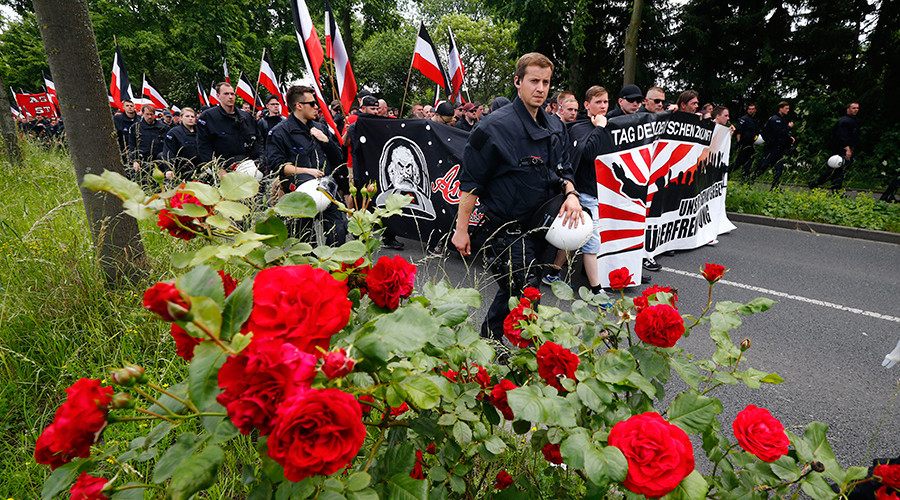Hundreds of pro-White activists gathered in the western German city of Dortmund for an annual demonstration against immigration and the government’s policy of multiculturalism. The event was met with numerous counter-protests.
Activists from various German far-right and neo-Nazi movements marched through the center and the western districts of Dortmund. According to police estimates, about 900 people took part, while some witnesses and local media claim the number of anti-migrant protesters reached 1000.
Members of the radical Hogesa (Hooligans against Salafists) group were reportedly among the far-right protesters.
The far-right rally in Dortmund, held under the slogan “A Day of the German Future,” was an annual event organized by various far-right organizations throughout Germany and is often closely associated with neo-Nazi groups. The demonstration was initiated by Michael Bruck, who is member of the small radical Die Rechte (The Right) party and also a member of Dortmund’s city council.
According to the event’s official website, the demonstrators were protesting against what they called “over-foreignization,” by which they mean mass immigration, the German government’s open-door asylum policy, the ongoing refugee crisis, and the concept of multiculturalism.
The organizers first planned to hold the rally in the northern district of Dortmund where many migrants, refugees, and asylum seekers live, but city authorities banned the far-right groups from marching there, citing security concerns.
The far-right march started at 1:00 pm local time (12:00 GMT). According to witnesses, the right-wing contingent “slowly marched” through the western part of the city from the Dorsfeld district to the Huckarde district. Law enforcement reported no clashes between far-right protesters and the police officers.
The rally also sparked a wave of counter-protests. More than a dozen counter-demonstrations were held in the city, which were organized by civil activists and trade unions, as well as left-wing radicals. The total number of people participating in the counter-rallies reached 5,000, about 2,500 of which were members of the radical leftist organizations, according to police reports.
About 5,000 police officers equipped with pepper spray and water cannon were deployed to maintain order and prevent outbreaks of violence and scuffles between far-right demonstrators and counter-protesters.
The counter-protesters repeatedly tried to block or hamper the far-right march by staging sitting demonstrations, with some even building barricades on several of the city’s streets. One sitting rally was staged at the city’s railway station in an attempt to prevent the far-right protesters from arriving in Dortmund. The anti-fascists also tried to block the railway lines, but were dispersed by police.
In another incident, three police officers were injured as they tried to break down a barricade built by counter-protesters, German WDR news reports. There have also been clashes between police and leftist radicals that left “numerous” police officers injured, local media report.
Meanwhile, an anti-refugee rally was staged in the central German city of Erfurt. Hundreds of people joined the demonstration to protest multiculturalism and decry the arrival of refugees to Europe.
The protesters marched through the city for three hours chanting “We are the people!” while holding up placards reading “For maintaining the freedom of speech,” “For the general referendum,” “Against the arbitrariness of the government.” They also waved German national flags, as well as the flags of some other European nations.
Some protesters carried a huge banner that read “Asylum fraud makes us poor” and others reading “Islam, no, thanks.”
The anti-refugee march was met by a counter-protest. Counter-protesters held up placards that read “Nazism, no, thanks” and “Solidarity against Nazis.” There was a heavy police presence in the city during the two rallies.
Clashes between right-wing protesters and pro-refugee demonstrators have become a frequent sight across Europe, with tensions often flaring due to the unprecedented refugee crisis afflicting the Europe.
Crime statistics released by Germany’s Interior Ministry show that politically-motivated crimes and acts of violence have increased dramatically in 2015. Most of the politically motivated crimes were committed by far-right radicals, while left-wing extremists committed half as many.

